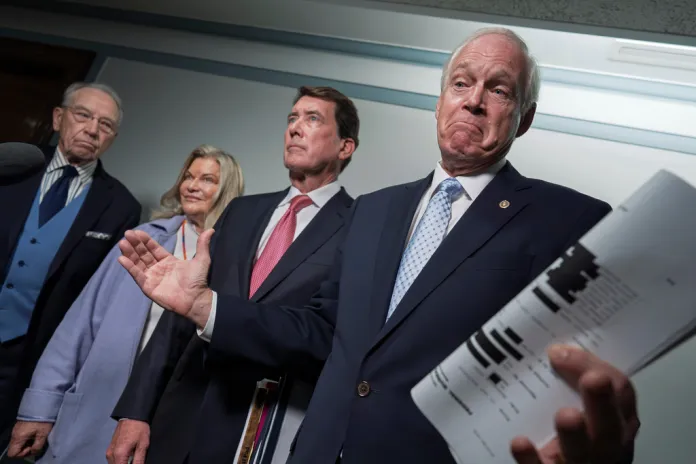Conservatives on Capitol Hill are in store for painful calculations over more spending to extend expiring Obamacare subsidies, a contentious subject that GOP leaders begrudgingly concede they’ll ultimately need to address to pass long-term government funding.
It’s a tough pill to swallow for fiscal hawks, who described it to the Washington Examiner as hypocritical of the party’s supposed desires to rein in out-of-control spending and the latest example of Republicans misusing their control over Washington.
“I’ve often heard, if you have nothing nice to say, say nothing at all,” Sen. Ron Johnson (R-WI) said.
Sen. Cynthia Lummis (R-WY) labeled any form of extension for the pandemic-era enhanced benefits an “expensive band aid.”
“COVID is over. So, it’s time to resume lower levels of spending,” Lummis said. “If we’re going to talk about more spending, we need to take a more holistic look at Obamacare and not just continue band-aid-spending that costs a quarter of a trillion dollars.”
Senate Republicans will need Democrats to break filibusters to end the shutdown and pass an annual budget, the price tag to do so being an eventual agreement on the boosted tax credits that are due to expire at year’s end. But a faction of rank-and-file Republicans in both chambers say some form of extension is a necessity to blunt what is forecasted to otherwise be skyrocketing monthly premiums next year for plans on the Affordable Care Act marketplace.
“Congress owns this problem. Previous Congresses have created it,” Sen. Josh Hawley (R-MO) said. “We should probably think more holistically about how to fix [Obamacare]. But in the interim, what are we going to say to hundreds of thousands of Missourians — millions of Americans? Like just, ‘Good luck to you.’”
Extending the subsidies in their current form indefinitely would cost an estimated $350 billion over the next 10 years. It’s an improbable outcome, with Republican majorities in Congress and Trump in the White House. But GOP leaders acknowledge the across-the-aisle demands for a scaled-back extension. Even with cutting eligibility, the price tag is likely to still be tens of billions of dollars.
Negotiations between the parties on lowering the cost, such as by shortening the time span or slashing income caps, have yet to transpire. Republicans remain firm that Democrats must first help to reopen the government.
“A conversation about what we do on the expiring enhanced ACA subsidies — there’s a lot of conversations going on around that, but that doesn’t happen until we get the government open,” Senate Majority Leader John Thune (R-SD) told reporters Friday.
Fiscal hawks are facing their latest round of heartburn after being confronted this summer with what they called the “staggering” price of President Donald Trump’s One Big Beautiful Bill Act, which added $3.4 trillion to the deficit over the next decade. Johnson was among the critics, but other Republicans and the White House contended that the figure, from the nonpartisan Congressional Budget Office, was inaccurate and failed to consider enough economic factors.

Trump’s $2 billion DC ‘beautification’ plan will also force Republicans seeking to slash the deficit to stomach more spending.
“Obviously, if you talk to most members of our Conference… they feel strongly that Obamacare itself and the subsidies have failed,” House Majority Leader Steve Scalise (R-LA) said. “It’s helped insurance companies pad their bottom line, but it’s crushed families who are paying higher premiums. So, why would you keep pouring billions more tax dollars into a sinkhole when you can find a better way?”
There are potentially promising signs among Republicans for future negotiations. Rep. Marjorie Taylor Greene (R-GA) has emerged as an unlikely advocate for attaching an extension to a government funding bill and aligning herself with Democrats. Notably, House Freedom Caucus members have not ruled out supporting an extension, if changes are made.
OSSOFF STICKS WITH TRUMP RESISTANCE DESPITE SHUTDOWN PRESSURE
“If there’s going to be some realistic plan to rectify that, I’m all ears,” Rep. Scott Perry (R-PA) told reporters Friday.
The group’s chairman, Rep. Andy Harris (R-MD), speaking on the same call with reporters, foreshadowed a “discussion [that] will take a while” and must be “much more inclusive than just extending COVID-era Obamacare subsidies to insurance companies.”
Lauren Green contributed to this report.
